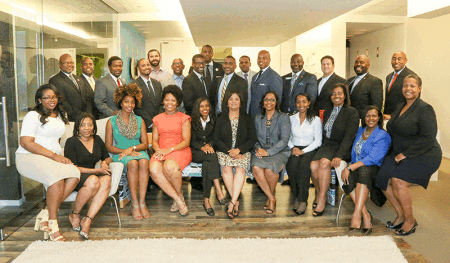The Real Estate Associate Program (REAP) is widely acknowledged to be the most successful diversity initiative in the commercial real estate industry. This market-driven program serves as a bridge between talented minority professionals and commercial real estate companies looking for talent. ULI, along with several other industry associations, is proud to support REAP.
In the last century, the U.S. military high command learned that talent and leadership are not exclusive to any single ethnicity or sex. As a result, women and men from multicultural backgrounds have been entrusted with the command of military units—large and small—as well as multimillion-dollar assets such as attack aircraft. And Americans are now accustomed to seeing images on television, whether in recruitment ads or overseas battlegrounds, of minority women and men serving the republic.
By comparison, the progress of diversity and inclusion in the commercial real estate (CRE) industry has seemed to move at a snail’s pace. The statistics estimating the participation of minorities in the professional ranks of CRE companies are astoundingly low for a nation that brandishes its diversity. However, a professional development initiative called Project REAP has been providing educational and networking opportunities to enable aspiring deal-makers to “be all that they can be” in CRE. REAP conducts the equivalent of a ten-week boot camp in CRE fundamentals for minority professionals seeking to enter and advance in the industry. The program recently completed classes in Atlanta and New York City—with rave reviews from the program participants as well as the instructors who taught the classes. (REAP’s instructors are seasoned industry practitioners who volunteer during evening hours for this initiative.) I was honored to speak at the graduation ceremony for the 2016 NYC class, featured in the photo above.
That NYC class is indicative of the organization’s mission of identifying talented women and men who harbor professional or entrepreneurial ambitions in the CRE sector. The classes were hosted at the NYC headquarters of the International Council of Shopping Centers (ICSC), with additional industry association support from ULI, NAIOP, BOMA, the National Apartment Association, and the National Multifamily Housing Council. Some of the participating students were attorneys, and others were financial services industry professionals hailing from organizations such as Goldman Sachs, Bank of America, and J.P. Morgan Chase. Some were accomplished residential real estate brokers, and others had backgrounds in fields such as information technology and the arts. Some were bilingual, with fluency in Mandarin, Spanish, French, and Japanese. And some had distinct geographical and cultural perspectives as a result of upbringings in locales as diverse as Kansas City, the Philippines, Haiti, and Tokyo. Those New York and Atlanta classes will soon be joined in September by additional programs in Dallas, Chicago, and Washington, D.C.
An outmoded line of thinking persists premised on the notion—whether publicly admitted or not—that recruiting diversity candidates is somehow akin to a zero-sum game. Yet, we have long accepted that diversity is prudent when it comes to managing financial assets. So if we know that we should diversify our financial capital across a diverse portfolio of equities and bonds, why don’t CRE organizations treat their human capital similarly? Shouldn’t the professional ranks of the nation’s real estate investment trusts (REITs), developers, and brokerage companies include the “growth stocks” of the future—talent with diverse skill sets and perspectives that can reap future dividends? The evidence suggests they should: REAP alumni now serve as senior executives in the real estate divisions of companies such as Walmart, MetLife, IKEA, and Tiffany & Company. If diversity can be an asset for Tony Award–winning productions on Broadway, it can also be an asset for the owners of the office buildings, hotels, and apartment buildings that line Broadway—as well as other commercial districts in the United States.
REAP was formed almost 20 years ago by Mike Bush, a visionary former corporate real estate executive who noticed that developers consistently failed to demonstrate diversity in their employment practices. When he challenged them on that failing, the typical response was that “we would be glad to hire minorities and women if we could just find qualified individuals.” Increasingly, enlightened CRE executives (and their commercial tenants, mayors, and other stakeholders) are rejecting that timeworn cliché. REAP exists to take that excuse off the table, while serving CRE’s human capital needs in an increasingly globalized industry. Diversity is not organized political correctness; it is the correct way to manage the human capital of nonpolitical organizations.
REAP National Video Presentation from ICSC on Vimeo.







